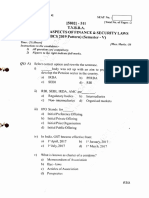0 ratings0% found this document useful (0 votes)
38 viewsWhat Are The Characteristics of A Contract of Partnership?
What Are The Characteristics of A Contract of Partnership?
Uploaded by
Benilda AgabinThe document discusses various aspects of partnerships under Philippine law. It defines the key characteristics of a contract of partnership, including that it is consensual, nominate, bilateral, onerous, preparatory, and commutative. It also lists the essential features of a partnership, which are that there must be a valid contract, the parties must have legal capacity, there must be mutual contribution to a common fund, the object must be lawful, and the purpose must be to obtain and divide profits. Finally, it poses 31 questions about legal characteristics, types, requirements, validity, existence, distinguishing features, objects, unlawful partnerships, forms, property acquisition and ownership, and universal vs particular partnerships.
Copyright:
© All Rights Reserved
Available Formats
Download as DOCX, PDF, TXT or read online from Scribd
What Are The Characteristics of A Contract of Partnership?
What Are The Characteristics of A Contract of Partnership?
Uploaded by
Benilda Agabin0 ratings0% found this document useful (0 votes)
38 views2 pagesThe document discusses various aspects of partnerships under Philippine law. It defines the key characteristics of a contract of partnership, including that it is consensual, nominate, bilateral, onerous, preparatory, and commutative. It also lists the essential features of a partnership, which are that there must be a valid contract, the parties must have legal capacity, there must be mutual contribution to a common fund, the object must be lawful, and the purpose must be to obtain and divide profits. Finally, it poses 31 questions about legal characteristics, types, requirements, validity, existence, distinguishing features, objects, unlawful partnerships, forms, property acquisition and ownership, and universal vs particular partnerships.
Original Description:
Study Guide in LAW
Original Title
SD1
Copyright
© © All Rights Reserved
Available Formats
DOCX, PDF, TXT or read online from Scribd
Share this document
Did you find this document useful?
Is this content inappropriate?
The document discusses various aspects of partnerships under Philippine law. It defines the key characteristics of a contract of partnership, including that it is consensual, nominate, bilateral, onerous, preparatory, and commutative. It also lists the essential features of a partnership, which are that there must be a valid contract, the parties must have legal capacity, there must be mutual contribution to a common fund, the object must be lawful, and the purpose must be to obtain and divide profits. Finally, it poses 31 questions about legal characteristics, types, requirements, validity, existence, distinguishing features, objects, unlawful partnerships, forms, property acquisition and ownership, and universal vs particular partnerships.
Copyright:
© All Rights Reserved
Available Formats
Download as DOCX, PDF, TXT or read online from Scribd
Download as docx, pdf, or txt
0 ratings0% found this document useful (0 votes)
38 views2 pagesWhat Are The Characteristics of A Contract of Partnership?
What Are The Characteristics of A Contract of Partnership?
Uploaded by
Benilda AgabinThe document discusses various aspects of partnerships under Philippine law. It defines the key characteristics of a contract of partnership, including that it is consensual, nominate, bilateral, onerous, preparatory, and commutative. It also lists the essential features of a partnership, which are that there must be a valid contract, the parties must have legal capacity, there must be mutual contribution to a common fund, the object must be lawful, and the purpose must be to obtain and divide profits. Finally, it poses 31 questions about legal characteristics, types, requirements, validity, existence, distinguishing features, objects, unlawful partnerships, forms, property acquisition and ownership, and universal vs particular partnerships.
Copyright:
© All Rights Reserved
Available Formats
Download as DOCX, PDF, TXT or read online from Scribd
Download as docx, pdf, or txt
You are on page 1of 2
1. What are the characteristics of a contract of partnership?
The characteristics of a contract of partnership are the following:
Consensual – Implied agreement of two or more persons;
Nominate – Special name in our law;
Bilateral – obligations arising therefrom are always reciprocal for
both partners;
Onerous – both parties aspire to procure for himself a benefit
through giving of something;
Preparatory- the contract was entered into as a means to an end
which is for the realization of profit.
Commutative - each partner's obligation is measured based on the
other's
Principal - does not depend on another contract for its existence or
validity.
2. What are the essential features of a partnership?
Essential features of partnerships:
1.There must be a valid contract ;
2.The parties must have legal capacity to enter into the contract;
3.There must be a mutual contribution of money, property, or industry to a
common fund;
4.The object must be lawful ; and
5.The purpose or primary purpose must be to obtain profits and to divide the
same among the parties
3. What are the legal characteristics of partnership?
4. Classify partnership (a) as to object, (b) as to liability, (c) as to term of existence
5. What are the kinds of partners?
6. What are the requisites of a contract of partnership with a capital of P3,000.00 or
more in money or property?
7. Will the partnership be void if it is not registered with the Securities and
Exchange Commission, having a capital of P3,000.00 or more?
8. When shall a partnership be considered void?
9. What are the rules in determining the existence of a partnership?
10. A sold his entire business including its goodwill to B on terms providing that A
shall receive for a period of five years 30% of the net profits of the business
conducted by B. Does this constitute a partnership between A and B?
11. Distinguish partnership from co-ownership.
12. Distinguish partnership from joint stock company.
13. What must be object or purpose of a partnership?
14. In case an unlawful partnership is dissolved by judicial decree, how shall the
profits be appropriated?
15. Give at least two (2) examples of unlawful partnerships?
16. In what form shall a partnership be constituted?
17. Can a partnership acquire immovable property?
18. Define universal partnership of all present property.
19. In a universal partnership of all present property which property becomes the
common property of all the partners?
20. May the partners contribute future properties to a universal partnership of all
present property?
21. Define universal partnership of profits?
22. If a partner in a universal partnership of profits wins the first prize in the lotto
draw during the existence of the partnership, is the partner required to turn over
the winnings to the partnership?
23. To whom shall movable or immovable property which each of the partners may
possess at the time of the celebration of the contract of universal partnership of
profits pertain?
24. If such movable or immovable property shall pertain exclusively to the partner
who owns it at the time of the celebration of the contract, what then shall pass to
the partnership?
25. Will the usufruct of properties subsequently acquired by the partners in a
universal partnership of profits belong to the partnership?
26. How shall the partnership be treated in case the articles of partnership fail to
specify its nature whether it is one of “present property” or of “profits”?
27. Who are the persons prohibited from entering into a universal partnership?
28. When are donations considered void and therefore prohibited?
29. Define particular partnership.
30. Can husband and wife enter into a particular partnership?
31. What is the fundamental difference between a universal partnership and a
particular partnership?
You might also like
- RFBT-05 (Partnerships)Document12 pagesRFBT-05 (Partnerships)VKVCPlays100% (1)
- PARTNERSHIPDocument20 pagesPARTNERSHIPJohn Ervin TalagaNo ratings yet
- Business Laws (Chapter 1 and 2)Document19 pagesBusiness Laws (Chapter 1 and 2)The Brain Dump PHNo ratings yet
- Effectiveness of Social Media AdvertisingDocument75 pagesEffectiveness of Social Media AdvertisingAngelRamosManahan85% (26)
- Marketing Chase Saphire PDFDocument9 pagesMarketing Chase Saphire PDFAshish GondaneNo ratings yet
- SD5Document1 pageSD5Benilda AgabinNo ratings yet
- Study Guide No. 19Document1 pageStudy Guide No. 19Benilda AgabinNo ratings yet
- Chapter 2 - Obligations of The Partners Section 1Document12 pagesChapter 2 - Obligations of The Partners Section 1Mhae DuranNo ratings yet
- RFBT Review-partnership-General PrinciplesDocument4 pagesRFBT Review-partnership-General PrinciplesteumaetocarrotNo ratings yet
- Resa PARTNERSHIPDocument12 pagesResa PARTNERSHIPArielle D.No ratings yet
- Partnership ReviewerDocument7 pagesPartnership ReviewershelNo ratings yet
- Aug29 Synchronous-Session Partnership Part-1Document7 pagesAug29 Synchronous-Session Partnership Part-1Jhoanne Marie TederaNo ratings yet
- The Law On PartnershipDocument4 pagesThe Law On Partnership123445No ratings yet
- Bus. Laws Reg. Mgt. Final Exam 2021 Partnership Law Part 2 ANTAODocument4 pagesBus. Laws Reg. Mgt. Final Exam 2021 Partnership Law Part 2 ANTAONur Jihad AntaoNo ratings yet
- Business Law and Regulations C1Document25 pagesBusiness Law and Regulations C1Rosemarie CamposNo ratings yet
- Law ReviewerDocument9 pagesLaw ReviewerAngelica Mae MonongNo ratings yet
- PartnershipDocument5 pagesPartnershipAlthea Faye RabanalNo ratings yet
- RFBT 05 PartnershipsDocument12 pagesRFBT 05 PartnershipsMeeka CalimagNo ratings yet
- Regulatory Framework in Business Transactions: Law On PartnershipDocument16 pagesRegulatory Framework in Business Transactions: Law On PartnershipDan DiNo ratings yet
- Reviewer ATPDocument8 pagesReviewer ATPCarlos JamesNo ratings yet
- PARTNERSHIPDocument23 pagesPARTNERSHIPLovely CachoNo ratings yet
- Chapter 01 - Partnership Nature and ConceptsDocument11 pagesChapter 01 - Partnership Nature and ConceptsMarjorie Joyce BarituaNo ratings yet
- Oint Enture Contract ChecklistDocument3 pagesOint Enture Contract ChecklistZulaine GuerraNo ratings yet
- RFBT 05 PartnershipsDocument14 pagesRFBT 05 PartnershipsGwy PagdilaoNo ratings yet
- NEU PartnershipsDocument9 pagesNEU PartnershipsTricia CruzNo ratings yet
- Business Law and Regulation-Partnership-Part1Document10 pagesBusiness Law and Regulation-Partnership-Part1Margie RosetNo ratings yet
- Law Partnership and CorporationDocument19 pagesLaw Partnership and Corporationleayer alvarezNo ratings yet
- Law On Parcor Study GuideDocument16 pagesLaw On Parcor Study GuideMariel DimaculanganNo ratings yet
- RFBT-05 (Partnerships)Document14 pagesRFBT-05 (Partnerships)Gup KnwNo ratings yet
- CML4607F Week 9 NotesDocument14 pagesCML4607F Week 9 Notessiphosethutwetwela100No ratings yet
- PARTNERSHIPSDocument4 pagesPARTNERSHIPSSandy HipeNo ratings yet
- Instructions: Use and Edit This File To Answer The Second Part of Your Final Examination Submit TheDocument4 pagesInstructions: Use and Edit This File To Answer The Second Part of Your Final Examination Submit TheDia Mae Ablao GenerosoNo ratings yet
- PARTNERSHIPDocument19 pagesPARTNERSHIPRyan LipayNo ratings yet
- PartnershipDocument8 pagesPartnershipBai Dianne BagundangNo ratings yet
- Law Prelim, Midterm, Last TermDocument96 pagesLaw Prelim, Midterm, Last TermDark Star ThreshNo ratings yet
- 65f652a04ec6b21f95c2041b-1710641916-Partnership - P1Document13 pages65f652a04ec6b21f95c2041b-1710641916-Partnership - P1JanneNo ratings yet
- MODULE DWCC - Partnership Part1 OnlineDocument15 pagesMODULE DWCC - Partnership Part1 OnlineMarjorie PagsinuhinNo ratings yet
- Law On Business Organizations 2021Document58 pagesLaw On Business Organizations 2021BJ SoilNo ratings yet
- Partnerships Reviewer For CPA AspirantsDocument18 pagesPartnerships Reviewer For CPA Aspirantsojodelaplata1486No ratings yet
- Buslaw Reviewer Partnership and CorpoDocument125 pagesBuslaw Reviewer Partnership and Corpoyna kylene100% (3)
- (Regulatory Framework For Business Transactions) : PartnershipDocument10 pages(Regulatory Framework For Business Transactions) : PartnershipAnonymous YtNo ratings yet
- Study Guide 1Document7 pagesStudy Guide 1Marie Frances SaysonNo ratings yet
- 1st-Activity Partnership 01.19.2023Document2 pages1st-Activity Partnership 01.19.2023Mia FayeNo ratings yet
- Partnership Supplementary NotesDocument9 pagesPartnership Supplementary NotesIzele VillelaNo ratings yet
- BUEL Tutor Session 1Document32 pagesBUEL Tutor Session 1ntsikayomzi.sakataNo ratings yet
- Business LawDocument80 pagesBusiness LawFarhana DibagelenNo ratings yet
- PartnershipDocument4 pagesPartnershipAreeba SohailNo ratings yet
- The Law On Partnerships and Private CorporationsDocument32 pagesThe Law On Partnerships and Private CorporationsFluffy SnowbearNo ratings yet
- Business Law-1Document27 pagesBusiness Law-1rajshri0609No ratings yet
- Chapter 1 - Partnership AccountingDocument11 pagesChapter 1 - Partnership AccountingMark LopezNo ratings yet
- Week 6 Fundamentals of Partnership AccountingDocument33 pagesWeek 6 Fundamentals of Partnership AccountingHan ChinNo ratings yet
- Chapter 1 - Partnership Formation: Article 1767 of The Civil Code of The PhilippinesDocument14 pagesChapter 1 - Partnership Formation: Article 1767 of The Civil Code of The PhilippinesKyleRhayneDiazCaliwagNo ratings yet
- BL-2 Module 1 Topic 1Document12 pagesBL-2 Module 1 Topic 1Vinsmoke KaidoNo ratings yet
- Nwy Acct II ch-5@2015Document19 pagesNwy Acct II ch-5@2015newaybeyene5No ratings yet
- Module 1-Partnership FormationDocument15 pagesModule 1-Partnership FormationJonard baloyoNo ratings yet
- Partnership ConceptsDocument7 pagesPartnership ConceptsMariel TagubaNo ratings yet
- ARTICLE 1767. Ang Pakikipagsosyo oDocument4 pagesARTICLE 1767. Ang Pakikipagsosyo oTrisha Anne Aica RiveraNo ratings yet
- Legend - PPT - PartnershipDocument83 pagesLegend - PPT - PartnershipGm BesacruzNo ratings yet
- Contract of PartnershipDocument22 pagesContract of PartnershipUlol ka100% (1)
- Week 2 – Partnership (Contract of Partnership in General, Obligations of a Partner).docxDocument8 pagesWeek 2 – Partnership (Contract of Partnership in General, Obligations of a Partner).docxYellów PadNo ratings yet
- Understanding Commercial Real Estate Contracts: Commercial Real Estate Transactions Guide, #2From EverandUnderstanding Commercial Real Estate Contracts: Commercial Real Estate Transactions Guide, #2No ratings yet
- SD8Document1 pageSD8Benilda AgabinNo ratings yet
- Study Guide No. 26Document1 pageStudy Guide No. 26Benilda AgabinNo ratings yet
- Study Guide No. 27Document1 pageStudy Guide No. 27Benilda AgabinNo ratings yet
- Study Guide No. 24Document1 pageStudy Guide No. 24Benilda AgabinNo ratings yet
- Study Guide No. 8Document2 pagesStudy Guide No. 8Benilda AgabinNo ratings yet
- Corporate BrochureDocument23 pagesCorporate Brochure200electronicmailNo ratings yet
- DR Disc Bain CapitalDocument2 pagesDR Disc Bain CapitalNeelima MaheshwariNo ratings yet
- The Herbs & Spices Market in Romania: Food For Thought (FFT) Strategic Information ServicesDocument4 pagesThe Herbs & Spices Market in Romania: Food For Thought (FFT) Strategic Information ServicesAliki_AANo ratings yet
- Form GST REG-06: Government of IndiaDocument5 pagesForm GST REG-06: Government of IndiaVANAJAKSHI SNo ratings yet
- LinkedinDocument1 pageLinkedinsehra002No ratings yet
- Unit 4Document12 pagesUnit 4Cameron FernandesNo ratings yet
- HR FuckDocument2 pagesHR FuckNayce NajNo ratings yet
- Accounting Concepts: 1. Business Entity Concept or Separate Entity ConceptDocument4 pagesAccounting Concepts: 1. Business Entity Concept or Separate Entity ConceptTawanda Tatenda HerbertNo ratings yet
- Risk Management: Presentasi Untuk: PT - Truba Jurong EngineeringDocument18 pagesRisk Management: Presentasi Untuk: PT - Truba Jurong Engineeringrieza_fNo ratings yet
- Synopsis Sample FormatDocument7 pagesSynopsis Sample FormatSushant R Mendhe100% (2)
- Costing - Inter - AqDocument20 pagesCosting - Inter - AqRishwanth Sambath KumarNo ratings yet
- Phillips Carbon Black (PHICAR) : Growth Momentum To Sustain..Document9 pagesPhillips Carbon Black (PHICAR) : Growth Momentum To Sustain..hashximNo ratings yet
- Crypto Trading Robot Ecosystem WHITE PAPER (PDFDrive)Document31 pagesCrypto Trading Robot Ecosystem WHITE PAPER (PDFDrive)asvardnNo ratings yet
- CM Strat YipDocument9 pagesCM Strat Yipmeherey2kNo ratings yet
- Adjusted SG&ADocument6 pagesAdjusted SG&AJOHN KAISERNo ratings yet
- Cost of Going Global - McKinseyDocument5 pagesCost of Going Global - McKinseyMarianaVelezArteagaNo ratings yet
- Free Trade HomeworkDocument3 pagesFree Trade HomeworkZsa Zsa Nurfajriah MalluNo ratings yet
- Strategic Management: Lecture 1: What Is Strategy? What Is Strategy?Document21 pagesStrategic Management: Lecture 1: What Is Strategy? What Is Strategy?Carl ReyNo ratings yet
- Dividend Assessment: The Cash - Trust NexusDocument13 pagesDividend Assessment: The Cash - Trust NexusAnshik BansalNo ratings yet
- GST Challan PDFDocument2 pagesGST Challan PDFSmarttNo ratings yet
- 01 VIM 7 0 OverviewDocument32 pages01 VIM 7 0 OverviewMihai PaunescuNo ratings yet
- Chapter 7 Finma2Document71 pagesChapter 7 Finma2wynellamaeNo ratings yet
- General Mathematics Final ExamDocument2 pagesGeneral Mathematics Final ExamJude TanNo ratings yet
- QoenfoqienfoiqnefqefDocument5 pagesQoenfoqienfoiqnefqefCharmaine Mari OlmosNo ratings yet
- Qae Vol. 9 No. 2 Institutionalization of Quality Assurance Vol 9 No 2 3Document6 pagesQae Vol. 9 No. 2 Institutionalization of Quality Assurance Vol 9 No 2 3Renn M100% (1)
- 506B Legal Aspects of Finance and Security LawsDocument2 pages506B Legal Aspects of Finance and Security LawsManthanNo ratings yet
- Noc BikeDocument2 pagesNoc BikeJyoti RaoNo ratings yet





























































































